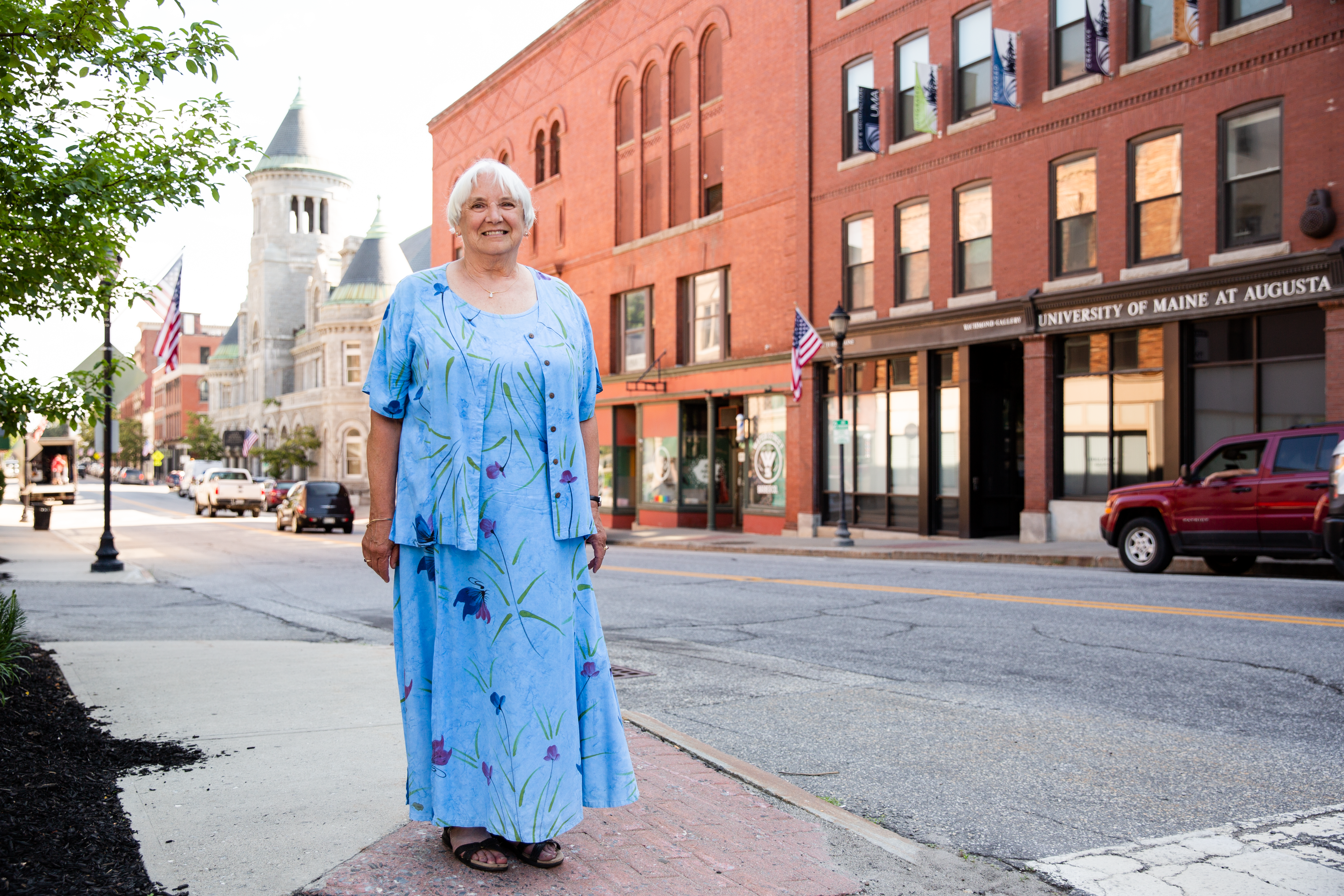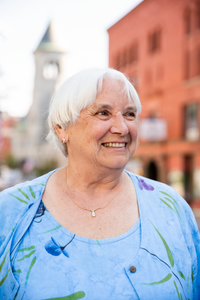New Beginnings

Photos by Eric Moran
New Beginnings
For 43 years, Gilda Nardone has helped Maine residents manage life changes, from navigating divorce to switching careers
The American divorce rate rose dramatically during the 1970s, leaving many women financially insecure, especially those who’d never done paid work outside the home. In 1975, a pair of California activists—57-year-old divorcée Tish Sommers and 55-year-old widow Laurie Shields—formed the Alliance for Displaced Homemakers to advocate for the needs of such women, taking up the motto “Don’t Agonize, Organize.” They lobbied for state and federal programs to help former homemakers successfully enter the workforce.
In Maine, two freshman female lawmakers took up the cause, sponsoring a bill to establish a Displaced Homemakers Program for their state. The bill passed in 1977 with an appropriation of $10,000. Within a year, the program had an advisory council and an ambitious young executive director, Gilda Nardone.
Nardone (’79) applied for the job as she was finishing the final credits for her master’s degree in educational administration from Wheelock College. A former childcare worker, Nardone had developed an interest in adult education during her time at Wheelock, and she felt strongly about supporting women through transitions. She had recently become divorced, and both her mother and grandmother had been young widows, forcing a transformation from homemaker to breadwinner.

Nardone began her work by organizing support groups for displaced homemakers in Maine. Soon, women in the groups began identifying what else they needed for training and support. “They were the ones who said, we need to learn how to write a résumé, how to interview, how to decide what a good job might be for me at this point in my life,” says Nardone. She listened to their requests and began building a curriculum.
For the next 43 years, Nardone led her organization through transitions of its own. In 1994, the Displaced Homemakers Program changed its name to the Maine Center for Women, Work, and Community. “We had broadened our audience,” says Nardone, “and we wanted a name that gave a sense of women moving forward.” What had begun as an underfunded effort to help mid-life and older women build confidence and transfer homemaking skills to the workplace had become a statewide organization teaching women of all ages business and entrepreneurship skills and advocating for women’s economic interests on the state and national levels.
In 2015, the organization renamed itself New Ventures Maine to reflect further expansion in its services and target population. It had begun coordinating conferences to introduce girls to careers in trade and technical fields, expanded its training and support for entrepreneurs, and added financial literacy courses. While the organization retained its focus on empowering women, its services became available to all Maine residents.
Today, New Ventures Maine (NVME) has 19 staff members, 17 locations throughout the state, and a budget of nearly $2 million. It’s supported by state and federal funds, and by private grants and donors. Through free classes and individual coaching, NVME helps Maine residents of all socioeconomic backgrounds find a job, start or return to college, launch a small business, or get a handle on their finances. The organization provides intensive services to more than 1,400 people each year and reaches thousands more through conferences and financial coaching. As the pandemic has pushed so many people—particularly women—into unexpected life and career adjustments, there has been a renewed emphasis on the importance of NVME’s services.
Confronting Change
Nardone says there are at least two keys to successfully navigating transition: be patient with the process, and listen to as many guiding voices as you can.
“Sometimes change happens to people. Sometimes people want to make it happen,” Nardone says. Either way, it’s common for people facing change to be confused about what their next steps should be. “And people who aren’t comfortable sitting with the unknown can move too quickly,” she says, “making a decision without having thoroughly thought it through or done the research.”
True transformation takes time, Nardone says, which is why many of NVME’s programs are multiweek courses rather than one-session workshops. The organization’s popular career-planning programs use a framework to guide students along. “First you have to explore—you explore the external environment, and you explore your own internal environment, assessing your skills and interests. Then you begin to identify some areas of focus. You do more research on those and test them out,” Nardone explains. “It’s a cyclical process, rather than a straight line. You’re assessing, reflecting, integrating information, making decisions—and then, often, starting that process again at a different level.”
Sometimes change happens to people. Sometimes people want to make it happen. And people who aren’t comfortable sitting with the unknown can move too quickly, making a decision without having thoroughly thought it through or done the research.
Working with instructors—and with classmates from a wide range of backgrounds—also provides people a sounding board for their ideas and helps them see their situation from different perspectives. For Ellen Thayer, a graduate of NVME’s “Venturing Forth” program, those perspectives were invaluable.
Thayer enrolled in the entrepreneurship program in 2011 after having been laid off from her job as a television meteorologist. “I was ready to say goodbye to this business of TV weather,” she says, “because the whole industry was changing and salaries were coming down.” An oil painter with many artistic interests, Thayer wanted to try making a living as a creative entrepreneur.
Through the program, Thayer met a lawyer who discussed various business structures, an accountant who talked about business taxes, an expert in trade shows, a representative of Maine’s Small Business Administration, and fellow entrepreneurs with great ideas of their own. Many relationships Thayer developed during the program continue to this day.
Today, Thayer owns the business Love Rocks Me. She creates artistic designs using heart-shaped rocks gathered from Maine beaches, photographs the designs, and then prints them on posters, cards, magnets, and mugs. Her products are in more than 250 stores around the country.
The Next Step
For the past year, Nardone has been carefully planning for another major transition—her own retirement, which becomes effective December 31, 2021. True to form, Nardone took time to map out a plan and listened to many voices during the process. She hired a consultant to teach NVME’s management team about building strategic relationships and asked each of her direct reports what they needed from her before her departure.
Looking back over her career, Nardone says she’s proud to have helped so many people set and achieve their goals, “whether it’s graduating from college, landing a good job with benefits, starting and growing a successful small business, or managing their money and beginning to build assets.” She’s also proud of the positive changes she’s overseen at NVME, expanding programs, building partnerships, and influencing policy decisions that have improved the economic security of women and families. There’s more to do, she adds: before her retirement, she began exploring NVME’s potential role in protecting the environment and supporting racial equity, and the coronavirus pandemic made it clear that women need more support in balancing employment with caregiving.
Nardone is frequently asked how she remained in the same role for more than four decades.
“I’ve never been bored,” she says, because the job provided constant opportunities to learn and grow. She’s also relished being in a position to advance gender equity in Maine. After years as a volunteer in the women’s movement in the 1970s (producing newsletters, facilitating consciousness-raising groups, staffing a rape crisis line), she feels honored and grateful to have made a career helping people—and especially women—move their lives forward.